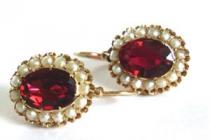For thirty years now I have been studying my fellow-men. I do not know very much about them. I suppose it is on the face that for the most part we judge the persons we meet. We draw our conclusions from the shape of the jaw, the look in the eyes, the shape of the mouth. I shrug my shoulders when people tell me that their first impressions of a person are always right. For my own part I find that the longer I know people the more they puzzle me: my oldest friends are just those of whom I can say that I don"t know anything about them.
These thoughts have occurred to me because I read in this morning"s paper that Edward Hyde Burton had died at Kobe. He was a merchant and he had been in Japan for many years. I knew him very little, but he interested me because once he gave me a great surprise. If I had not heard the story from his own lips I should never have believed that he was capable of such an action. It was the more startling because both his appearance and his manner gave the impression of a very different man. He was a tiny little fellow, very slender, with white hair, a red face much wrinkled, and blue eyes. I suppose he was about sixty when I knew him. He was always neatly and quietly dressed in accordance with his age and station.
Though his offices were in Kobe Burton often came down to Yokohama. I happened on one occasion to be spending a few days there, waiting for a ship, and I was introduced to him at the British Club. We played bridge together. He played a good game and a generous one. He did not talk very much, either then or later when we were having drinks, but what he said was sensible. He had a quiet, dry humour. He seemed to be popular at the club and afterwards, when he had gone, they described him as one of the best. It happened that we were both staying at the Grand Hotel and next day he asked me to dine with him. I met his wife, fat, elderly and smiling, and his two daughters. It was evidently a united and loving family. I think the chief thing that struck me about Burton was his kindliness. There was something very pleasing in his mild blue eyes. His voice was gentle; you could not imagine that he could raise it in anger; his smile was kind. Here was a man who attracted you because you felt in him a real love for his fellows. He had charm. But there was nothing sentimental about him: he liked his game of cards and his cocktail, he could tell a good and spicy story, and in his youth he had been something of an athlete. He was a rich man and he had made every penny himself. I suppose one thing that made you like him was that he was so small and frail; he aroused your instincts of protection. You felt that he would not hurt a fly.
One afternoon I was sitting in the lounge of the Grand Hotel. From the windows you had an excellent view of the harbour with its crowded traffic. There were great liners; merchant ships of all nations, junks and boats sailing in and out. It was a busy scene and yet, I do not know why, restful to the spirit.
Burton came into the lounge presently and caught sight of me. He seated himself in the chair next to mine.
"What do you say to a little drink?"
He clapped his hands for a boy and ordered two drinks. As the boy brought them a man passed along the street outside and seeing me waved his hand.
"Do you know Turner?" said Burton as I nodded a greeting.
"I"ve met him at the club. I"m told he"s a remittance man."
"Yes, I believe he is. We have a good many here."
"He plays bridge well."
"They generally do. There was a fellow here last year, a namesake of mine, who was the best bridge player I ever met. I suppose you never came across him in London. Lenny Burton he called himself."
"No. I don"t believe I remember the name."
"He was quite a remarkable player. He seemed to have an instinct about the cards. It was uncanny. I used to play with him a lot. He was in Kobe for some time."
Burton sipped his gin.
"It"s rather a funny story,", he said. "He wasn"t a bad chap. I liked him. He was always well-dressed and he was handsome in a way, with curly hair and pink-and-white cheeks. Women thought a lot of him. There was no harm in him, you know, he was only wild. Of course he drank too much. Fellows like him always do. A bit of money used to come in for him once a quarter and he made a bit more by card-playing. He won a good deal of mine, I know that."
Burton gave a kindly little chuckle.
"I suppose that is why he came to me when he went broke, that and the fact that he was a namesake of mine. He came to see me in my office one day and asked me for a job. I was rather surprised. He told me that there was no more money coming from home and he wanted to work. I asked him how old he was.
"Thirty five," he said.
""And what have you been doing before?" I asked him.
""Well, nothing very much," he said.
"I couldn"t help laughing.
""I"m afraid I can"t do anything for you just now," I said. "Come back and see me in another thirty-five years, and I"ll see what I can do."
"He didn"t move. He went rather pale. He hesitated for a moment and then he told me that he had had bad luck at cards for some time. He hadn"t a penny. He"d pawned everything he had. He couldn"t pay his hotel bill and they wouldn"t give him any more credit. He was down and out. If he couldn"t get a job he"d have to commit suicide.
"I looked at him for a bit. I could see now that he was all to pieces. He"d been drinking more than usual and he looked fifty.
""Well, isn"t there anything you can do except play cards?" I asked him.
""I can swim," he said.
"I could hardly believe my ears; it seemed such a silly answer.
""I swam for my university."
""I was a pretty good swimmer myself when I was a young man," I said.
"Suddenly I had an idea.
Pausing in his story, Burton turned to me.
"Do you know Kobe?" he asked.
"No," I said, "I passed through it once, but I only spent a night there."
"Then you don"t know the Shioya Club. When I was a young man I swam from there round the beacon and landed at the creek of Tarumi. It"s over three miles and it"s rather difficult on account of the currents round the beacon. Well, I told my young namesake about it and I said to him that if he"d do it I"d give him a job.
"I could see he was rather taken aback.
""You say you"re a swimmer," I said.
""I"m not in very good condition," he answered.
"I didn"t say anything. I shrugged my shoulders. He looked at me for a moment and then he nodded.
""All right," he said. "When do you want me to do it?"
"I looked at my watch. It was just after ten.
"The swim shouldn"t take you much over an hour and a quarter. I"ll drive round to the creek at half-past twelve and meet you. I"ll take you back to the club to dress and then we"ll have lunch together."
""Done," he said.
"We shook hands. I wished him good luck and he left me. I had a lot of work to do that morning and I only just managed to get to the creek at half past twelve. I waited for him there, but in vain."
"Did he get frightened at the last moment?" I asked.
""No, he didn"t. He started swimming. But of course he"d ruined his health by drink. The currents round the beacon were more than he could manage." We didn"t get the body for about three days."
I didn"t say anything for a moment or two. I was a little shocked. Then I asked Burton a question.
"When you offered him the job, did you know that he"d be drowned?"
He gave a little mild chuckle and he looked at me with those kind blue eyes of his. He rubbed his chin with his hand.
"Well, I hadn"t got a vacancy in my office at the moment."
TEXT. A FRIEND IN NEED by William Somerset Maugham (abridged)
Maugham, William Somerset (1874-1965): an English writer. He achieved a great success as a novelist with such novels as "Of Human Bondage", "The Razor"s Edge" and others, as a dramatist with Ms witty satirical plays "Our Betters", "The Circle", etc., but he is best known by his short stories.
At the beginning of his literary career Maugham was greatly influenced by French naturalism. Later on, his outlook on life changed. It became cool, unemotional and pessimistic. He says that life is too tragic and senseless to be described. A writer can"t change life, he must only try to amuse his reader, stir his imagination. And this is where Maugham achieves perfection: his stories are always fascinating. Maugham"s skill in depicting scenes and characters with a few touches is amazing and whether he means it or not his novels, stories and plays reveal the vanity, hypocrisy and brutality of the society he lives in. So does the story "A Friend in Need". Burton, a prosperous businessman, is not.in the least concerned about the troubles and needs of those who have failed in life. Without a moment"s hesitation he sends a man to death just because his presence bores him, and later on he remembers the fact with a "kindly chuckle".
When Maugham described people and places in his short stories, he did it mostly from his personal experience.
"It"s rather a funny story," he said. "He wasn"t a bad chap. I liked him. He was always well-dressed and smart-looking. He was handsome in a way, with curly hair and pink-andwhite cheeks. Women thought a lot of him. There was no harm in him, you know, he was only wild. Of course he drank too much. Those sort of fellows always do. A bit of money used to come in for him once a quarter and he made a bit more by card-playing. He won a good deal of mine, I know that."
Burton gave a kindly little chuckle. I knew from my own experience that he could lose money at bridge with a good grace.
"I suppose that is why he came to me when he went broke, that and the fact that he was a namesake of mine. He came to see me in my office one day and asked me for a job. I was rather surprised. He told me that there was no more money coming from home and he wanted to work. I asked him how old he was.
"Thirty-five," he said.
"And what have you been doing hitherto?" I asked him.
"Well, nothing very much," he said.
I couldn"t help laughing.
"I"m afraid I can"t do anything for you just yet," I said. "Come back and see me in another thirty-five years, and I"ll see what I can do."
He didn"t move. He went rather pale. He hesitated for a moment and then told me that he had had bad luck at cards for some time. He hadn"t been willing to stick to bridge, he"d been playing poker, and he"d got trimmed. He hadn"t a penny. He"d pawned everything he had. He couldn"t pay his hotel bill and they wouldn"t give him any more credit. He was down and out. If he couldn"t get something to do he"d have to commit suicide.
I looked at him for a bit. I could see now that he was all to pieces. He"d been drinking more than usual and he looked fifty. The girls wouldn"t have thought so much of him if they"d seen him then.
"Well, isn"t there anything you can do except play cards?" I asked him.
"I can swim," he said.
"Swim!"
I could hardly believe my ears; it seemed such an insane answer to give.
"I swam for my university."
I got some glimmering of what he was driving at. I"ve known too many men who were little tin gods at their university to be impressed by it.
"I was a pretty good swimmer myself when I was a young man," I said.
Suddenly I had an idea.
Pausing in his story, Burton turned to me.
"Do you know Kobe?" he asked.
"No," I said, "I passed through it once, but I only spent a night there."
"Then you don"t know the Shioya Club. When I was a young man I swam from there round the beacon and landed at the creek of Tarumi. It"s over three miles and it"s rather difficult on account of the currents round the beacon. Well, I told my young namesake about it and I said to him that if he"d do it I"d give him a job. I could see he was rather taken aback.
"You say you"re a swimmer," I said.
"I"m not in very good condition," he answered.
I didn"t say anything. I shrugged my shoulders. He looked at me for a moment and then he nodded.
"All right," he said. "When do you want me to do it?"
I looked at my watch. It was just after ten.
"The swim shouldn"t take you much over an hour and a quarter. I"ll drive round to the creek at half past twelve and meet you. I"ll take you back to the club to dress and then we"ll have lunch together,"
"Done," he said.
We shook hands. I wished him good luck and he left me. I had a lot of work to do that morning and I only just managed to get to the creek at Tarumi at half past twelve. But I needn"t have hurried; he never turned up."
"Did he funk it at toe last moment?" I asked.
"No, he didn"t funk it. He started all right. But of course he"d ruined his constitution by drink and dissipation. The currents round the beacon were more than he could manage. We didn"t get the body for about three days."
I didn"t say anything for a moment or two, I was a trifle shocked. Then I asked Burton a question.
"When you made him that offer of a job, did you know he"d be drowned?"
He gave a little mild chuckle and he looked at me with those kind and candid blue eyes of his. He rubbed his chin with his hand.
"Well, I hadn"t got a vacancy in my office at the moment.
TEXT. A FRIEND IN NEED by William Somerset Maugham (abridged) Maugham, William Somerset (1874-1965): an English writer. He achieved a great success as a novelist with such novels as "Of Human Bondage", "The Razor"s Edge" and others, as a dramatist with Ms witty satirical plays "Our Betters", "The Circle", etc., but he is best known by his short stories. At the beginning of his literary career Maugham was greatly influenced by French naturalism. Later on, his outlook on life changed. It became cool, unemotional and pessimistic. He says that life is too tragic and senseless to be described. A writer can"t change life, he must only try to amuse his reader, stir his imagination. And this is where Maugham achieves perfection: his stories are always fascinating. Maugham"s skill in depicting scenes and characters with a few touches is amazing and whether he means it or not his novels, stories and plays reveal the vanity, hypocrisy and brutality of the society he lives in. So does the story "A Friend in Need". Burton, a prosperous businessman, is not.in the least concerned about the troubles and needs of those who have failed in life. Without a moment"s hesitation he sends a man to death just because his presence bores him, and later on he remembers the fact with a "kindly chuckle". When Maugham described people and places in his short stories, he did it mostly from his personal experience. "It"s rather a funny story," he said. "He wasn"t a bad chap. I liked him. He was always well-dressed and smart-looking. He was handsome in a way, with curly hair and pink-andwhite cheeks. Women thought a lot of him. There was no harm in him, you know, he was only wild. Of course he drank too much. Those sort of fellows always do. A bit of money used to come in for him once a quarter and he made a bit more by card-playing. He won a good deal of mine, I know that." Burton gave a kindly little chuckle. I knew from my own experience that he could lose money at bridge with a good grace. "I suppose that is why he came to me when he went broke, that and the fact that he was a namesake of mine. He came to see me in my office one day and asked me for a job. I was rather surprised. He told me that there was no more money coming from home and he wanted to work. I asked him how old he was. "Thirty-five," he said. "And what have you been doing hitherto?" I asked him. "Well, nothing very much," he said. I couldn"t help laughing. "I"m afraid I can"t do anything for you just yet," I said. "Come back and see me in another thirty-five years, and I"ll see what I can do." He didn"t move. He went rather pale. He hesitated for a moment and then told me that he had had bad luck at cards for some time. He hadn"t been willing to stick to bridge, he"d been playing poker, and he"d got trimmed. He hadn"t a penny. He"d pawned everything he had. He couldn"t pay his hotel bill and they wouldn"t give him any more credit. He was down and out. If he couldn"t get something to do he"d have to commit suicide. I looked at him for a bit. I could see now that he was all to pieces. He"d been drinking more than usual and he looked fifty. The girls wouldn"t have thought so much of him if they"d seen him then. "Well, isn"t there anything you can do except play cards?" I asked him. "I can swim," he said. "Swim!" I could hardly believe my ears; it seemed such an insane answer to give. "I swam for my university." I got some glimmering of what he was driving at. I"ve known too many men who were little tin gods at their university to be impressed by it. "I was a pretty good swimmer myself when I was a young man," I said. Suddenly I had an idea. Pausing in his story, Burton turned to me. "Do you know Kobe?" he asked. "No," I said, "I passed through it once, but I only spent a night there." "Then you don"t know the Shioya Club. When I was a young man I swam from there round the beacon and landed at the creek of Tarumi. It"s over three miles and it"s rather difficult on account of the currents round the beacon. Well, I told my young namesake about it and I said to him that if he"d do it I"d give him a job. I could see he was rather taken aback. "You say you"re a swimmer," I said. "I"m not in very good condition," he answered. I didn"t say anything. I shrugged my shoulders. He looked at me for a moment and then he nodded. "All right," he said. "When do you want me to do it?" I looked at my watch. It was just after ten. "The swim shouldn"t take you much over an hour and a quarter. I"ll drive round to the creek at half past twelve and meet you. I"ll take you back to the club to dress and then we"ll have lunch together," "Done," he said. We shook hands. I wished him good luck and he left me. I had a lot of work to do that morning and I only just managed to get to the creek at Tarumi at half past twelve. But I needn"t have hurried; he never turned up." "Did he funk it at toe last moment?" I asked. "No, he didn"t funk it. He started all right. But of course he"d ruined his constitution by drink and dissipation. The currents round the beacon were more than he could manage. We didn"t get the body for about three days." I didn"t say anything for a moment or two, I was a trifle shocked. Then I asked Burton a question. "When you made him that offer of a job, did you know he"d be drowned?" He gave a little mild chuckle and he looked at me with those kind and candid blue eyes of his. He rubbed his chin with his hand. "Well, I hadn"t got a vacancy in my office at the moment.
Определить язык Клингонский Клингонский (pIqaD) азербайджанский албанский английский арабский армянский африкаанс баскский белорусский бенгальский болгарский боснийский валлийский венгерский вьетнамский галисийский греческий грузинский гуджарати датский зулу иврит игбо идиш индонезийский ирландский исландский испанский итальянский йоруба казахский каннада каталанский китайский китайский традиционный корейский креольский (Гаити) кхмерский лаосский латынь латышский литовский македонский малагасийский малайский малайялам мальтийский маори маратхи монгольский немецкий непали нидерландский норвежский панджаби персидский польский португальский румынский русский себуанский сербский сесото словацкий словенский суахили суданский тагальский тайский тамильский телугу турецкий узбекский украинский урду финский французский хауса хинди хмонг хорватский чева чешский шведский эсперанто эстонский яванский японский Клингонский Клингонский (pIqaD) азербайджанский албанский английский арабский армянский африкаанс баскский белорусский бенгальский болгарский боснийский валлийский венгерский вьетнамский галисийский греческий грузинский гуджарати датский зулу иврит игбо идиш индонезийский ирландский исландский испанский итальянский йоруба казахский каннада каталанский китайский китайский традиционный корейский креольский (Гаити) кхмерский лаосский латынь латышский литовский македонский малагасийский малайский малайялам мальтийский маори маратхи монгольский немецкий непали нидерландский норвежский панджаби персидский польский португальский румынский русский себуанский сербский сесото словацкий словенский суахили суданский тагальский тайский тамильский телугу турецкий узбекский украинский урду финский французский хауса хинди хмонг хорватский чева чешский шведский эсперанто эстонский яванский японский Источник: Цель:
Результаты (русский ) 1:
ТЕКСТ. ПОТРЕБНОСТЬ в друг, Уильям Сомерсет Моэм (в сокращении)
Моэм, Уильям Сомерсет (1874-1965): английский писатель. Он достиг большой успех как писатель с таких романов, как «В рабство», «Лезвие бритвы» и другие, как драматург с Ms остроумные сатирические пьесы «Наши вышестоящие», «Круг» и т.д., но он наиболее известен по его короткие рассказы.
В начале своей литературной карьеры Моэм был значительно под влиянием французского натурализма. Позже, его взгляд на жизнь изменилась. Стало прохладно, бесстрастным и пессимистический. Он говорит, что жизнь слишком трагической и бессмысленно быть описаны. Писатель не может изменить жизнь, он должен только попытаться развлечь его читатель, перемешать его воображение. И это, где Моэм достигает совершенства: его рассказы и всегда увлекательны. Моэм мастерство в изображении сцен и персонажей с несколько штрихов является удивительным, и он значит ли она или не его романы, рассказы и пьесы показывают тщеславия, лицемерия и жестокости общества, в котором он живет. Так же рассказ «друг в беде». Бертон, процветающего бизнесмена, не является.в наименее обеспокоены проблемы и потребности тех, кто не удалось в жизни. Без колебаний момент он посылает человека к смерти только потому, что его присутствие надоедает ему, и позже он помнит тот факт с «любезно смешок».
когда Моэм описал людей и мест в его коротких рассказов, он сделал это главным образом из его личного опыта.
«Это довольно смешная история»,-сказал он. «Он не был плохой chap. Я любил его. Он всегда был хорошо одет и подтянутый. Он был красив, в некотором смысле, с вьющимися волосами и розовый andwhite щеки. Женщины думали много его. Не было никакого вреда в нем, вы знаете, он был только дикие. Конечно он выпил слишком много. Всегда делать эти рода стипендиатов. Немного денег используется для прийти на него один раз в квартал, и он сделал немного больше, играя в карты. Он выиграл немало моих, я знаю, что».
Бертон дал любезно маленький смешок. Из моего собственного опыта я знал, что он может потерять деньги на мост с хорошим Грейс.
"я полагаю, именно поэтому он пришел ко мне, когда он пошел разбил, это и тот факт, что он был тезкой шахты. Он пришел, чтобы увидеть меня в моем офисе один день и попросил меня на работу. Я был весьма удивлен. Он сказал мне, что там было не больше денег, поступающих из дома, и он хотел работать. Я спросил его, сколько лет ему было.
«Тридцать пять,» он сказал.
«И то, что вы делали до сих пор?» Я спросил его.
«Ну, ничего, не очень много,» он сказал.
я не мог помочь смеясь.
«Я боюсь, я не могу сделать что-нибудь для вас только пока»,-сказал я. «Вернуться и увидеть меня в еще тридцать пять лет, и я буду видеть, что я могу сделать.»
Он не двигаться. Он пошел довольно бледно. Он колебался на минуту и потом сказал мне, что он имел несчастье в карты на некоторое время. Он не был готов придерживаться мост, он играл в покер, и он получил подстриг. Он не копейки. Он все, что он pawned. Он не мог оплатить его счет отеля, и они не дают ему больше кредит. Он был вниз и наружу. Если он не мог получить что-то делать, он будет иметь для совершения самоубийства.
я посмотрел на него немного. Я мог видеть теперь, что он был всех на куски. Он пил больше, чем обычно, и он выглядел пятидесяти. Девушки бы подумал так много его если они видели его затем.
«Ну, не существует ничего вы можете сделать, кроме играть карты?» Я спросил его.
«Я могу плавать,» он сказал.
«Swim»!
Я едва мог поверить своим ушам; казалось такие безумные ответ дать.
«Я плавал на мой университет.»
я получил некоторые проблеск того, что он ехал на. Я знаю слишком много людей, которые были немного олова богов в их университете впечатлен его.
«Я был довольно хороший пловец сам когда я был молодым человеком,» я сказал.
я вдруг идея.
паузы в его истории, Бертон обратился к me.
«Знаете ли вы Кобе?» он спросил.
«Нет», я сказал, «Я прошел через это один раз, но я только провел там ночь.»
", То вы не знаете Shioya клуб. Когда я был молодым человеком я поплыл от там вокруг маяка и приземлился на крик Tarumi. Это более трех миль, и довольно трудно из-за течения вокруг маяка. Ну я сказал моей молодой тезка об этом, и я сказал ему, что если он будет делать это я хотел бы дать ему работу. Я мог видеть, он довольно опешил.
«Вы говорите, вы пловец»,-сказал я.
«Я не в очень хорошем состоянии»,-ответил он.
ничего не сказал. Я пожал плечами. Он посмотрел на меня, на мгновение, и тогда он кивнул.
«Все в порядке», сказал он. «Когда вы хотите мне это сделать?»
Я посмотрел на мои часы. Это было только после автофильтра
«купаться вам не должны потребоваться гораздо более часа и четверти. Я диск раунда к ручью, в половине прошлые двенадцать и встретиться с вами. Я возьму вас обратно в клуб, чтобы одеваться, и тогда мы будем иметь обед вместе,»
«,» он сказал.
мы пожали друг другу руки. Я пожелал ему удачи и он оставил меня. У меня было много работы предстоит сделать утром, и я только что удалось попасть на крик в Tarumi в половине прошлые двенадцать. Но я не спешил; Он никогда не появился.»
«Он фанк его на мыс последний момент?» Я спросил.
«нет, он не его фанк. Он начал все в порядке. Но, конечно, он погубил его Конституции, напиток и диссипации. Токи вокруг маяка были больше, чем он может управлять. Мы не получили тела около трех дней.»
Я не говорю что-нибудь на минуту или две, я был немного шокирован. Тогда я спросил Бертон вопрос.
«Когда вы сделали его что предложения о работе, знаете ли вы, что он бы утонул?»
Он дал маленький мягкий смешок, и он посмотрел на меня с теми рода и откровенные голубые глаза его. Он потер подбородок с его рук.
«Ну, я не получил вакансии в моем офисе на данный момент.
Результаты (русский ) 2:
ТЕКСТ. Друг в беде Уильям Сомерсет Моэм (в сокращении)
Моэма, Уильям Сомерсет (1874-1965): английского писателя. Он достиг больших успехов как романист с такими романами, как «Из правам кабалы", "по лезвию бритвы» и другие, как драматург с г-жой остроумных сатирических пьес "Наши Беттерс", "The Circle" и т.д., но он Самый известный его рассказов.
В начале своей литературной деятельности Моэма находился под сильным влиянием французского натурализма. Позже его взгляды на жизнь изменились. Стало прохладно, бесстрастным и пессимистический. Он говорит, что жизнь слишком трагична и бессмысленна, которые будут описаны. Писатель не может изменить жизнь, он должен только попробовать, чтобы развлечь читателя, размешать его воображение. И вот тут Моэм достигает совершенства: его рассказы всегда интересно. Умение Моэма в изображающих сцены и персонажей с несколькими штрихами удивительна и означает ли он это или не его романы, рассказы и пьесы раскрывают тщеславие, лицемерие и жестокость общества он живет дюйма Так же рассказ "Друг в беде" . Бертон, преуспевающим бизнесменом, является not.in мере обеспокоены проблемами и потребностями тех, кто не в жизни. Не колеблясь ни минуты, он посылает человека до смерти только потому, что его присутствие отверстий его, и позже он помнит тот факт, с "любезно хихикать".
Когда Моэм описал людей и места в его рассказах, он сделал это в основном из его личного опыта.
"Это довольно забавная история", сказал он. "Он не был плохим парнем. Я любил его. Он всегда хорошо одет и подтянутый. Он был красив таким образом, с вьющимися волосами и розово-andwhite щеки. Женщины много думал о нем. Был нет вреда в него, вы знаете, он был только дикий. Конечно, он слишком много выпил. Те рода товарищей всегда. Немного денег, используемых прийти на него один раз в квартал, и он сделал немного больше по карт-игры. Он выиграл немало моих, я знаю, что ".
Бертон дал любезно мало смешок. Я знал по собственному опыту, что он может потерять деньги на мост с хорошим изяществом.
"Я полагаю, что именно поэтому он пришел ко мне, когда он пошел ва-банк, что и то, что он был тезка мой. Он пришел ко мне в моем кабинете один день и попросил меня на работу. Я был весьма удивлен. Он сказал мне, что больше не было денег, поступающих от дома, и он хотел работать. Я спросил его, сколько ему лет.
"Тридцать пять", он сказал.
"И что вы делали до сих пор?" Я спросил его.
"Ну, ничего очень много", сказал он.
Я не мог удержаться от смеха.
"Я боюсь, что я ничего не могу сделать для вас прямо сейчас, "сказал я." Вернись ко мне в еще тридцать пять лет, и я посмотрю, что я могу сделать. "
Он не двигался. Он пошел довольно бледно. Он на мгновение замялся, а затем сказал мне, что он имел несчастье в карты в течение некоторого времени. Он не был готов придерживаться моста, он играет в покер, и он получил обрезаны. Он имел ни гроша. Он заложил все, что имел. Он не мог оплатить его счета наличными и они не будут давать ему больше очков. Он разорился. Если он не мог получить что-то делать, он должен был бы покончить с собой.
Я посмотрел на него некоторое время. Я мог видеть теперь, когда он был все на куски. Он пил больше, чем обычно, и он выглядел на пятьдесят. Девушки не было бы так много думал о нем, если они видели его тогда.
"Ну, не так ли, что вы можете сделать, кроме как играть в карты?" . Я спросил его,
"Я умею плавать", сказал он.
"плавать!"
Я едва мог поверить своим ушам; казалось такой безумный ответ дать.
"Я плавал на моем университете."
я получил некоторые проблески, что он ехал со скоростью. Я знаю слишком много людей, которые были маленькие боги олова в их университете, чтобы быть впечатлен им.
"Я был довольно хороший пловец себя, когда я был молодым человеком," сказал я.
Вдруг у меня была идея.
Приостановка в своем рассказе Бертон повернулся ко мне.
"Знаете ли вы, Кобе?" спросил он.
"Нет", я сказал: "Я прошел через это один раз, но я только провел ночь там."
"Тогда вы не знаете Shioya клуб. Когда я был молодым человеком, я плавал оттуда вокруг маяка и приземлился в ручье в Tarumi. Это более трех миль, и это довольно сложно из-за токов вокруг маяка. Ну, я сказал мой молодой тезка об этом, и я сказал ему, что если он сделает это, я дал бы ему работу. Я видел, что он был довольно озадачен.
"Ты говоришь, что пловец," сказал я.
"Я не в очень хорошем состоянии," он ответил.
Я ничего не сказал. Я пожал плечи. Он посмотрел на меня на мгновение, а затем он кивнул.
"Хорошо," сказал он. "Когда вы хотите, чтобы я сделал это?"
Я посмотрел на часы. Это было сразу после десяти.
"Плавание не должны" т вас много более часа с четвертью. Я отвезу круглый к ручью на 12:30 и встретиться с вами. Я возьму тебя обратно в клуб, чтобы одеть и тогда мы пообедаем вместе ",
"Готово", сказал он.
Мы пожали друг другу руки. Я пожелал ему удачи, и он оставил меня. У меня было много работы, чтобы сделать В то утро, и я едва успел добраться до ручья на Tarumi в 12:30 Но я не должен поспешил;. он так и не появился ".
"Он фанк его на пальце ноги в последний момент?" Я спросил.
"Нет, он не фанк его. Он начал все в порядке. Но, конечно, он разрушил его конституцию напитка и рассеивания. Токи круглые маяка были больше, чем он мог управлять. Мы не получали тело в течение примерно трех дней. "
Я ничего не сказал на мгновение или два, я был немного в шоке. Тогда я спросил Бертон вопрос.
"Когда вы сделали его, что предложения о работе, знаете ли вы, что он будет утонул?"
Он дал немного мягкий смешок, и он посмотрел на меня с тех видов и откровенные голубыми глазами из его. Он потер подбородок рукой.
"Ну, я не получил вакансии в моем офисе в данный момент.
переводится, пожалуйста, подождите..
Результаты (русский ) 3:
Текст. Друзья познаются в Уильяма Сомерсета Моэма (сокращенный)
Сомерсета Моэма, Уильям Сомерсет (1874-1965): английский писатель. Ему удалось добиться большого успеха как романиста с таких рассказов "людских кабала", "его", и другие, как Борис Гафуров с MS опалу жума играет "негативом", "Круг", и т.д., но он лучше всего известна его коротких рассказов.
В начале его литературной карьере Сомерсета Моэма был во многом влияет по-французски простирая ввысь. Позже, его перспектив в жизни изменилось. Она стала остыть, без обиняков и пессимистический. Он утверждает, что жизнь слишком трагической и бессмысленной. Писатель не могу изменить жизнь, он должен лишь попытаться развлекать его устройство чтения мультимедийных карт, перемешайте его воображения. И именно это Сомерсета Моэма достигает совершенства.Его рассказы всегда очаровывает. Сомерсета Моэма, skill, изображающие сцены и символов в прошлом и будет ли он означает, что он или нет его романы, рассказы и играет свидетельствуют о раковина, лицемерия и жестокости в обществе он живет в. Это не история "Друзья познаются в". Burton, процветающего предпринимателя, не является.В меньшей мере выражает обеспокоенность по поводу проблем и потребностей тех, кто не удалось в жизни. Без момент колебаний он отправляет до смерти одного человека только из-за того, что его присутствие отверстия, и позднее он запомнит факт с "любезно Соколовы" .
при Сомерсета Моэма описано людей и мест в его коротких рассказов, он в основном из его личного опыта.
"она довольно забавное история", он говорит."Он не самое плохое. Мне понравилась ему. Он всегда был хорошо одет и smart. Он был красивым и вьющиеся волосы и розового andwhite щеки. Женщин мысли много ему. Не было никакого вреда в него, вы знаете, он был всего лишь дикой. Разумеется, он выпил слишком много. Эти сортировать стипендиатов всегда делать. Немного денег используется в для него один раз в квартал, и он сделал больше по карте.Он выиграл в деятельности, связанной с разминированием, я знаю, что. "
Бертон представил любезно мало Соколовы. Я знал из моего собственного опыта, что он может потерять деньги на мост с хорошей льготный.
"Я полагаю, именно поэтому он пришел ко мне когда он сломал, и тот факт, что он является "Выхино" - "Таганская. Он пришел ко мне в моей канцелярии один день и просил меня для задания. Я был весьма удивлен.Он сказал мне, что нет больше денег, поступающих от дома и он хотел бы работать. Я задал ему вопрос о том, как старый он был.
"тридцать пять", - сказал он.
"и, до сих пор?" Я спросил, не.
"хорошо, ничего не очень много", - сказал он.
я не мог удержаться от смеха.
"Боюсь, я не могу это сделать что-нибудь для вас еще не время," Я и сказал. "Вернуться ко мне в другом тридцать пять лет, и я увижу что делать. "
Он не перемещается. Он довольно бледно. Он без колебаний на мгновение, затем сказал мне, что он был не везёт на на протяжении некоторого времени. Он не был готов для Memory Stick на мост, он играет Poker, и он бы получил обрезки. Он не взглянул. Он бы у россиян все, что он имеет. Он не смог бы его отеля и законопроект о они бы не дать ему все больше кредитов. Он был.Если он не мог попасть в это он бы совершить самоубийство.
я его немного. Я мог видеть сейчас, он всех на куски. Он бы был доступ к питьевой воде больше, чем обычно и он с интересом ожидает пятьдесят. Девочек никогда бы не подумали так много его, если они бы его затем.
"а также, есть ли все, что вы можете сделать за исключением играть карты?" Я спросил, не.
"Я могу купаться", - сказал он.
"купаться! "
я вряд ли мог бы мне уши;Представляется такой безумной ответ дать.
"Я пародируя для моего университета. " [ 1]
я видел, как некоторые из признаемся самим себе о том, что он ехал на. Я слишком много мужчин, которые были мало тин богов в их университете будут поражены его.
"Я был довольно тушить я лично когда я был молодым человеком," Я сказал.
внезапно я была идея.
приостановка в его рассказе, Burton в меня.
"Знаете ли вы, что Коби?" - спросил он.
"нет", я сказал,"Я прошел через это, но я только вечером. "
", затем вы не знаете Shioya клуб. Когда я был молодым человеком я пародируя оттуда на проблесковый маячок и приземлился в крик от Tarumi. Она более трех миль, и она довольно сложно из-за течения на проблесковый маячок. А также, я сказал молодых казаков Платова об этом и я сказал ему, что если он решил сделать это я ему задания.Я мог бы см. Он был весьма удивлен.
"Вы говорите вы - трехкратный олимпийский чемпион,. Я сказал.
"я не в очень хорошем состоянии," он ответил.
а я и не говорю. Я Дьячковский мои плечи. Он посмотрел на меня и кивнул.
"все права," он говорит. "Когда мне лучше это сделать? "
я с интересом ожидает на мои часы. Он был всего лишь после десяти.
"купаться не следует принимать вас гораздо более чем на час и на четверть.Я диск к крик на половине последние двенадцать и встречи с вами. Я возьму вас обратно в клуб для одежды и затем мы сможете пообедать вместе, "
"Выполнено", - сказал он.
мы пожали друг другу руки. Я пожелал ему удачи, и он оставил мне. Я многое сделать сегодня утром, и я только что удалось получить на крик на Tarumi на половине последние двенадцать. Но мне не надо было случайный характер; он никогда не повернут вверх. "
"Он фанк ей на ноги последний момент?" Я спросил.
"Нет, он не фанк. Он начал все права. Но и он бы из строя его конституции, напиток и рассеивание тепла. течений на проблесковый маячок были более чем он не может управлять. Мы не за три дня. "
я не говорю что-нибудь момент или два, я был келдыша потрясены. Затем я спросил Бертон вопрос.
"Когда вы сделали его в том, что предлагают задания, знаете ли вы, что он бы утонул? "
он мало мягкое Соколовы и он посмотрел на меня с эти добрые и откровенный голубые глаза его. Он насыпал его подбородок с его стороны.
"а также, я не есть вакансии в моей канцелярии в настоящий момент.
переводится, пожалуйста, подождите..
(Story by S. Maugham)
For thirty years now I have been studying my fellow-men. I do not know very much about them. I suppose it is on the face that for the most part we judge 2 the persons we meet. We draw our conclusions from the shape of the jaw, the look in the eyes, the shape of the mouth. I shrug my shoulders when people tell me that their first impressions of a person are always right. For my own part 3 I find that the longer I know people the more they puzzle me: my oldest friends are just those of whom I can say that I don’t know anything about them.
These thoughts have occurred to me because I read in this morning’s paper that Edward Hyde Burton had died at Kobe. He was a merchant and he had been in Japan for many years. I knew him very little, but he interested me because once he gave me a great surprise. If I had not heard the story from his own lips I should never have believed that he was capable of such an action. It was the more startling because both his appearance and his manner gave the impression of a very different man. He was a tiny little fellow, very slender, with white hair, a red face much wrinkled, and blue eyes. I suppose he was about sixty when I knew him. He was always neatly and quietly dressed in accordance with his age and station.
Though his offices were n Kobe Burton often came down to Yokohama. I happen on one occasion to be spending 4 a few days there, waiting for a ship, and I was introduced to him at the British Club. We played bridge together. He played a good game and a generous one. 5 He did not talk very much, either then or later when we were having drinks, but what he said was sensible. He had a quiet, dry humour. He seemed to be popular at the club and best. It happened that we were both staying at the grand Hotel and next day he asked me to dine with him. I met his wife, fat, elderly and smiling, and his two daughters. It was evidently a united and loving family. I think the chief that struck me about Burton was his kindliness. There was something very pleasing in his mild blue eyes. His voice was gentle; you could not imagine that he could raise it in anger; his smile was kind. Here was a man who attracted you because you felt in him a real love for his fellows. He had charm. But there was nothing sentimental about him: he liked his game of cards and his cocktail, he could tell a good spicy story, and in his youth he had been something of an athlete. 6 He was a rich man and he had made every penny himself. I suppose one thing that made you like him was that he was so small and frail; he aroused your instincts of protection. You felt that he would not hurt a fly.
One afternoon I was sitting in the lounge of the Grant Hotel. From the windows you had an excellent view of the harbor with its crowded traffic. There were great liners; merchant ships of all nations, junks and boats sailing in and out. It was a busy scene and yet, I do not know why, restful to the spirit.
Burton came into the lounge presently and caught sight of me. He seated himself in the chair next to mine.
“What do you say to a little drink?”
He clapped his hands for a boy and ordered two drinks. As the boy brought them a man passed along the street outside and seeing me waved his hand.
“Do you know Turner?” said Burton as I nodded a greeting.
“ I’ve met him at the club. I’m told he is a remittance man.”
“ Yes, I believe he is. We have many here.”
“ He plays bridge well.”
“ They generally do. There was a fellow here last year, a namesake of mine, who was the best bridge player I ever met. I suppose you never came across him in London. Lenny Burton he called himself.”
“ No. I don’t believe I remember the name.” 7
“ He was quite a remarkable player. He seemed to have an instinct about the cards. 8 It was uncanny. I used to play with him a lot. He was in Kobe for some time.”
Burton sipped his gin.
“It is rather a funny story,” he said. “ He wasn’t a bad chap. I liked him. He was always well-dressed and he was handsome in a way, with curly hair and pink-and-white cheeks. Women thought a lot of him. 9 There was no harm in him, you know, he was only wild. Of course he drank too much. Fellows like him always do. A bit of money used to come in for him once a quarter and he made a bit more by card-playing. He won a good deal of mine, I know that.”
Burton gave a kindly little chuckle.
“I suppose that is why he came to me when he went broke, 10 that and the fact that he was a namesake of mine. He came to see me in my office one day and asked me for a job. I was rather surprised. He told me that there was no more money coming from home and he wanted to work. I asked him how old he was.
“Thirty five,” he said.
“And what have you been doing before?” I asked him.
“Well, nothing very much” 11 he said.
“I couldn’t help laughing.
“I’m afraid I can’t do anything for you just now,” I said. “Come back and see me in another thirty-five years, and I’ll see what I can do.”
“He didn’t move. He went rather pale. He hesitated for a moment and then he told me that he had had bad luck at cards for some time.
He hadn’t a penny. He’d pawned everything he had. He couldn’t pay his hotel bill and they wouldn’t give him any more credit. He was down and out. 12 If he couldn’t get a job he’d have to commit suicide.
I looked at him for a bit. I could see now that he was all to pieces. 13 He’d been drinking more than usual and he looked fifty.
“Well, isn’t there anything you can do except play cards?” I asked him.
“I can swim”, he said.
I could hardly believe my eyes; it seemed such a silly answer.
“I swam for my university.”
“I was a pretty good swimmer myself when I was a young man,” I said. Suddenly I had an idea. Pausing in his story, Burton turned to me.
“Do you know Kobe?” he asked.
“No,” I said, “I passed through it once, but I only spent a night there.”
“Then you don’t know the Shioya Club. When I was a young man I swam from there round the beacon and landed at the creek of Tarumi. It’s over three miles and it’s rather difficult on account of 14 the currents round the beacon. Well, I told my young namesake about it and I said to him that if he’d do it I’d give him a job. I could see he was rather taken aback. 15
“You say you’re a swimmer,” I said.
“I am not in a very good condition,” he answered.
I didn’t say anything. I shrugged my shoulders. He looked at me for a moment and then he nodded.
“All right, he said.” When do you want me to do it? ”
“I looked at my watch. It was just after ten.
“The swim shouldn’t take you much over an hour and a quarter. I’ll drive round to the creek at half-past twelve and meet you. I’ll take you back to the club to dress and then we’ll have lunch together.”
“Done,” 16 he said.
We shook hands. I wished him good luck and he left me. I had a lot of work to do that morning and I only just managed 17 to get to the creek at half past twelve. I waited for him there, but in vain.
“Did he get frightened at the last moment?” I asked.
“No, he didn’t. He started swimming. But of course he’d ruined his health by drink. The currents round the beacon were more than he could manage. 18 We didn’t get the body for about three days.”
I didn’t say anything for a moment or two. I was a little shocked. Then I asked Burton a question.
“When you offered him a job, did you know that he’d be drowned?”
He gave a little mild chuckle and he looked at me with those kind blue eyes of his. He rubbed his chin with his hand.
“Well, I hadn’t got a vacancy in my office at the moment.”
Vocabulary Notes
A friend in need(is a friend indeed). - Друг, не покинувший тебя в беде,- настоящий друг. (Английская пословица; ср.: Друзья познаются в беде.)
…it is on the face that for the most part we judge – именно по лицу мы большей частью и судим.
For my own part – что касается меня.
I happened… to be spending – мне случилось…провести.
He played a good game and a generous one. – Он играл толково и не скупясь.
…he had been something of an athlete – он был немного спортсмен.
No. I don’t believe I remember the name – Н.ет, я что-то не помню такого имени.
He seemed to have an instinct about the cards. – Им, казалось, руководило какое-то чутье при игре в карты.
Women thought a lot of him. – Он очень нравился женщинам.
10….to go broke – остаться без гроша.
11….nothing very much – ничего особенного.
12. He was down and out. – Он был на грани отчаяния.
13….all to pieces – изнуренный, в полном изнеможении.
14….on account of – из-за, по причине.
15….to take aback – поразить, ошеломить.
16. Done! – По рукам! Идет!
17. I only just managed – я едва успел.
18. The currents… were more than he could manage – Течения…оказались ему не под силу.
Exercises
Pre-reading Tasks
The title of the story you are going to read is the beginning of the proverb “A friend in need is a friend indeed”. Why do you think the author doesn’t give the end of the proverb?
Practice the pronunciation of the words from the story.
Jaw, wrinkled, Yokohama, quiet, Grand Hotel, Kobe, kindliness, athlete, lounge, harbor, remittance, handsome, won, pawn, suicide, drowned.
For thirty years now I have been studying my fellow-men. I do not know very much about them. I suppose it is on, the face that for the most part we judge the persons we meet. We draw our conclusions from the shape of the jaw, the look in the eyes, the shape of the mouth. I shrug my shoulders when people tell me that their first impressions of a person are always right. For my own part I find that the longer I know people the more they puzzle me: my oldest friends are just those of whom I can say that I don"t know anything about them.
These thoughts have occurred to me because I read in this morning"s paper that Edward Hyde Burton had died at Kobe. He was a merchant and he had been in Japan for many years. I knew him very little, but he interested me because once he gave me a great surprise. If I had not heard the story from his own lips I should never have believed that he was capable of such an action. It was the more startling because both his appearance and his manner gave the impression of a very different man. He was a tiny little fellow, very slender, with white hair, a red face much wrinkled, and blue eyes. I suppose he was about sixty when I knew him. He was always neatly and quietly dressed in accordance with his age and station.
Though his offices were in Kobe Burton often came down to Yokohama. I happened on one occasion to be spending a few days there, waiting for a ship, and I was introduced to him at the British Club. We played bridge together. He played a good game and a generous one. He did not talk very much, either then or later when we were having drinks, but what he said was sensible. He had a quiet, dry humour. He seemed to be popular at the club and afterwards, when he had gone, they described him as one of the best. It happened that we were both staying at the Grand Hotel and next day he asked me to dine with him. I met his wife, fat, elderly and smiling, and his two daughters. It was evidently a united and loving family. I think the chief thing that struck me about Burton was his kindliness. There was something very pleasing in his mild blue eyes. His voice was gentle; you could not imagine that he could raise it in anger; his smile was kind. Here was a man who attracted you because you felt in him a real love for his fellows. He had charm. But there was nothing sentimental about him: he liked his game of cards and his cocktail, he could tell a good and spicy story, and in his youth he had been something of an athlete. He was a rich man and he had made every penny himself. I suppose one thing that made you like him was that he was so small and frail; he aroused your instincts of protection. You felt that he would not hurt a fly.
One afternoon I was sitting in the lounge of the Grand Hotel. From the windows you had an excellent view of the harbour with its crowded traffic. There were great liners; merchant ships of all nations, junks and boats sailing in and out. It was a busy scene and yet, I do not know why, restful to the spirit.
Burton came into the lounge presently and caught sight of me. He seated himself in the chair next to mine.
"What do you say to a little drink?"
He clapped his hands for a boy and ordered two drinks. As the boy brought them a man passed along the street outside and seeing me waved his hand.
"Do you know Turner?" said Burton as I nodded a greeting.
"I"ve met him at the club. I"m told he"s a remittance man."
"Yes, I believe he is. We have a good many here."
"He plays bridge well."
"They generally do. There was a fellow here last year, a namesake of mine, who was the best bridge player I ever met. I suppose you never came across him in London. Lenny Burton he called himself."
"No. I don"t believe I remember the name."
"He was quite a remarkable player. He seemed to have an instinct about the cards. It was uncanny. I used to play with him a lot. He was in Kobe for some time."
Burton sipped his gin.
"It"s rather a funny story,", he said. "He wasn"t a bad chap. I liked him. He was always well-dressed and he was handsome in a way, with curly hair and pink-and-white cheeks. Women thought a lot of him. There was no harm in him, you know, he was only wild. Of course he drank too much. Fellows like him always do. A bit of money used to come in for him once a quarter and he made a bit more by card-playing. He won a good deal of mine, I know that."
Burton gave a kindly little chuckle.
"I suppose that is why he came to me when he went broke, that and the fact that he was a namesake of mine. He came to see me in my office one day and asked me for a job. I was rather surprised. He told me that there was no more money coming from home and he wanted to work. I asked him how old he was.
"Thirty five," he said.
""And what have you been doing before?" I asked him.
""Well, nothing very much," he said.
"I couldn"t help laughing.
""I"m afraid I can"t do anything for you just now," I said. "Come back and see me in another thirty-five years, and I"ll see what I can do."
"He didn"t move. He went rather pale. He hesitated for a moment and then he told me that he had had bad luck at cards for some time. He hadn"t a penny. He"d pawned everything he had. He couldn"t pay his hotel bill and they wouldn"t give him any more credit. He was down and out. If he couldn"t get a job he"d have to commit suicide.
"I looked at him for a bit. I could see now that he was all to pieces. He"d been drinking more than usual and he looked fifty.
""Well, isn"t there anything you can do except play cards?" I asked him.
""I can swim," he said.
"I could hardly believe my ears; it seemed such a silly answer.
""I swam for my university."
""I was a pretty good swimmer myself when I was a young man," I said.
"Suddenly I had an idea.
Pausing in his story, Burton turned to me.
"Do you know Kobe?" he asked.
"No," I said, "I passed through it once, but I only spent a night there."
"Then you don"t know the Shioya Club. When I was a young man I swam from there round the beacon and landed at the creek of Tarumi. It"s over three miles and it"s rather difficult on account of the currents round the beacon. Well, I told my young namesake about it and I said to him that if he"d do it I"d give him a job.
"I could see he was rather taken aback.
""You say you"re a swimmer," I said.
""I"m not in very good condition," he answered.
"I didn"t say anything. I shrugged my shoulders. He looked at me for a moment and then he nodded.
""All right," he said. "When do you want me to do it?"
"I looked at my watch. It was just after ten.
"The swim shouldn"t take you much over an hour and a quarter. I"ll drive round to the creek at half-past twelve and meet you. I"ll take you back to the club to dress and then we"ll have lunch together."
""Done," he said.
"We shook hands. I wished him good luck and he left me. I had a lot of work to do that morning and I only just managed to get to the creek at half past twelve. I waited for him there, but in vain."
"Did he get frightened at the last moment?" I asked.
""No, he didn"t. He started swimming. But of course he"d ruined his health by drink. The currents round the beacon were more than he could manage." We didn"t get the body for about three days."
I didn"t say anything for a moment or two. I was a little shocked. Then I asked Burton a question.
"When you offered him the job, did you know that he"d be drowned?"
He gave a little mild chuckle and he looked at me with those kind blue eyes of his. He rubbed his chin with his hand.
"Well, I hadn"t got a vacancy in my office at the moment."
For thirty years now I have been studying my fellow-men. I do not know very much about them. I suppose it is on the face that for the most part we judge the persons
we meet. We draw our conclusions from the shape of the jaw, the look in the eyes, the shape of the mouth. I shrug my shoulders when people tell me that their first impressions of a person are always right. For my own part
I find that the longer I know people the more they puzzle me: my oldest friends are just those of whom I can say that I don"t know anything about them.
These thoughts have occurred to me because I read in this morning"s paper that Edward Hyde Burton had died at Kobe. He was a merchant and he had been in Japan for many years. I knew him very little, but he interested me because once he gave me a great surprise. If I had not heard the story from his own lips I should never have believed that he was capable of such an action. It was the more startling because both his appearance and his manner gave the impression of a very different man. He was a tiny little fellow, very slender, with white hair, a red face much wrinkled, and blue eyes. I suppose he was about sixty when I knew him. He was always neatly and quietly dressed in accordance with his age and station.
Though his offices were in Kobe Burton often came down to Yokohama. I happened on one occasion to be spending a few days there, waiting for a ship, and I was introduced to him at the British Club. We played bridge together. He played a good game and a generous one. He did not talk very much, either then or later when we were having drinks, but what he said was sensible. He had a quiet, dry humour. He seemed to be popular at the club and afterwards, when he had gone, they described him as one of the best. It happened that we were both staying at the Grand Hotel and next day he asked me to dine with him. I met his wife, fat, elderly and smiling, and his two daughters. It was evidently a united and loving family. I think the chief thing that struck me about Burton was his kindliness. There was something very pleasing in his mild blue eyes. His voice was gentle; you could not imagine that he could raise it in anger; his smile was kind. Here was a man who attracted you because you felt in him a real love for his fellows. He had charm. But there was nothing sentimental about him: he liked his game of cards and his cocktail, he could tell a good and spicy story, and in his youth he had been something of an athlete
. He was a rich man and he had made every penny himself. I suppose one thing that made you like him was that he was so small and frail; he aroused your instincts of protection. You felt that he would not hurt a fly.
One afternoon I was sitting in the lounge of the Grand Hotel. From the windows you had an excellent view of the harbour with its crowded traffic. There were great liners; merchant ships of all nations, junks and boats sailing in and out. It was a busy scene and yet, I do not know why, restful to the spirit.
Burton came into the lounge presently and caught sight of me. He seated himself in the chair next to mine.
"What do you say to a little drink?"
He clapped his hands for a boy and ordered two drinks. As the boy brought them a man passed along the street outside and seeing me waved his hand.
"Do you know Turner?" said Burton as I nodded a greeting.
"I"ve met him at the club. I"m told he"s a remittance man."
"Yes, I believe he is. We have a good many here."
"He plays bridge well."
"They generally do. There was a fellow here last year, a namesake of mine, who was the best bridge player I ever met. I suppose you never came across him in London. Lenny Burton he called himself."
"No. I don"t believe I remember the name."
"He was quite a remarkable player. He seemed to have an instinct about the cards. It was uncanny. I used to play with him a lot. He was in Kobe for some time."
Burton sipped his gin.
"It"s rather a funny story,", he said. "He wasn"t a bad chap. I liked him. He was always well-dressed and he was handsome in a way, with curly hair and pink-and-white cheeks. Women thought a lot of him. There was no harm in him, you know, he was only wild. Of course he drank too much. Fellows like him always do. A bit of money used to come in for him once a quarter and he made a bit more by card-playing. He won a good deal of mine, I know that."
Burton gave a kindly little chuckle.
"I suppose that is why he came to me when he went broke
, that and the fact that he was a namesake of mine. He came to see me in my office one day and asked me for a job. I was rather surprised. He told me that there was no more money coming from home and he wanted to work. I asked him how old he was.
"Thirty five," he said.
""And what have you been doing before?" I asked him.
""Well, nothing very much," he said.
"I couldn"t help laughing.
""I"m afraid I can"t do anything for you just now," I said. "Come back and see me in another thirty-five years, and I"ll see what I can do."
"He didn"t move. He went rather pale. He hesitated for a moment and then he told me that he had had bad luck at cards for some time. He hadn"t a penny. He"d pawned everything he had. He couldn"t pay his hotel bill and they wouldn"t give him any more credit. He was down and out
. If he couldn"t get a job he"d have to commit suicide.
"I looked at him for a bit. I could see now that he was all to pieces. He"d been drinking more than usual and he looked fifty.
""Well, isn"t there anything you can do except play cards?" I asked him.
""I can swim," he said.
""Swim!"
"I could hardly believe my ears; it seemed such a silly answer.
""I swam for my university."
""I was a pretty good swimmer myself when I was a young man," I said.
"Suddenly I had an idea.
Pausing in his story, Burton turned to me.
"Do you know Kobe?" he asked.
"No," I said, "I passed through it once, but I only spent a night there."
"Then you don"t know the Shioya Club. When I was a young man I swam from there round the beacon and landed at the creek of Tarumi. It"s over three miles and it"s rather difficult on account of the currents round the beacon. Well, I told my young namesake about it and I said to him that if he"d do it I"d give him a job.
"I could see he was rather taken aback.
"You say you"re a swimmer," I said.
""I"m not in very good condition," he answered.
"I didn"t say anything. I shrugged my shoulders. He looked at me for a moment and then he nodded.
"All right," he said. "When do you want me to do it?"
"I looked at my watch. It was just after ten.
"The swim shouldn"t take you much over an hour and a quarter. I"ll drive round to the creek at half-past twelve and meet you. I"ll take you back to the club to dress and then we"ll have lunch together."
"Done," he said.
"We shook hands. I wished him good luck and he left me. I had a lot of work to do that morning and I only just managed to get to the creek at half past twelve. I waited for him there, but in vain."
"Did he get frightened at the last moment?" I asked.
"No, he didn"t. He started swimming. But of course he"d ruined his health by drink. The currents round the beacon were more than he could manage." We didn"t get the body for about three days."
I didn"t say anything for a moment or two. I was a little shocked. Then I asked Burton a question.
"When you offered him the job, did you know that he"d be drowned?"
He gave a little mild chuckle and he looked at me with those kind blue eyes of his. He rubbed his chin with his hand.
"Well, I hadn"t got a vacancy in my office at the moment."
Exercises
1. The title of the story is the beginning of the proverb ‘A friend in need is a friend indeed’. Why do you think the author doesn`t give the ending of the proverb?
2. Find in the story the English for:
Судить о человеке, делать вывод, озадачивать (ставить в тупик), приходить на ум, быть способным на что-то, морщинистый, повышать голос, и мухи не обидеть, помахать рукой, тезка, потягивать джин, быть высокого мнения о ком-либо, посмеиваться, в состоянии отчаяния, совершить самоубийство, измученный, течение, ошеломленный, пожелать удачи, тщетно (зря), подорвать здоровье, утонуть.
 3. Fill the gaps with these words or word combinations in an appropriate form:
3. Fill the gaps with these words or word combinations in an appropriate form:
- To draw conclusions
- In vain
- To wave one`s hand
- To sip
- A current
- To shrug one`s shoulders
- To be capable of
- Wrinkled
- To commit suicide
- To be drowned
1. We _____________ from the shape of the jaw, the look in the eye, the shape of the mouth.
2. I should never have believed that he __________ such an action.
3. He was a tiny, little fellow, very slender, with white hair, a red face much ______________ and blue eyes.
4. A man passed along the street outside and seeing me _____________.
5. Burton _________ his gin.
6. If he couldn`t get a job he`d have to _____________.
7. The __________ round the beacon were more than he could manage.
8. I ____________ when people tell me that their impressions of a person are always right.
9. I waited for him there but _________.
10. When you offered him a job did you know that he __________?
4. Replace the italicized words/ word combinations with a synonym:
- To judge
- A namesake of
- To raise one`s voice
- Puzzled
- To think a lot of
- To ruin one`s health
- To occur
- Down and out
1. We often form an opinion
about a person by his looks.
2. These thoughts came to my mind
because I read in this morning`s newspaper about Edward Burton`s death.
3. You could not imagine that he could speak in a higher tone
in anger.
4. There was a fellow there last year whose name was also
Edward.
5. Women thought highly of
him.
6. He was unemployed and without money
.
7. I could see he was rather taken aback
.
8. But of course he undermined his health
by drink.
Discussion points
Answer the following questions:
1) What thoughts occurred to the author when he read in a newspaper about Mr. Burton`s death?
2) Why did Mr. Burton interest the author?
3) Where did the author make Mr. Burton`s acquaintance?
4) What did the author know about Mr. Burton?
5) What attracted the author in Mr. Burton?
6) When and where did he tell the author the story of his namesake?
7) What kind of man was young Burton?
8) Why did he once come to Mr. Burton?
9) What was the situation he found himself in?
10) What idea did suddenly Mr. Burton have when his namesake said he had swum for the university?
11) Why was young Burton taken back?
12) Why was young Burton drowned?
13) What was the author`s reaction to the story?
14) Why did Mr. Burton say he offered his namesake a job?
Discuss the following:
1. Why would the author never have believed that Mr. Burton was capable of such an actionif he had not heard the story from his own lips? Do you think that the first impressions of a person are always right?
Comment on the following proverb (with referrence to the story):
Appearences are deceitful .
2. Make guesses about young Burton`s 35 years of life. Why had he never done anything in his life?
3. Is there any evidence in the story that Mr.Burton was not that kind and gentle? Why did he promise his namesake a job if the latter swam round the beacon? Did he know he would be drowned? Why did he come to the creek?
4. Why did Mr.Burton tell the author the story? Why did he say it was rather a funny story? Why did he give a little mild chuckle when the author asked him if he had known that the guy would be drowned?
5.What is the story about beneath the surface of the narrative? Explain the title of the story. What could have naturally expected of ‘a friend in need’ in that situation? What would you have told Mr.Burton if you had been his listener?
6. What is you main impression of the story?














